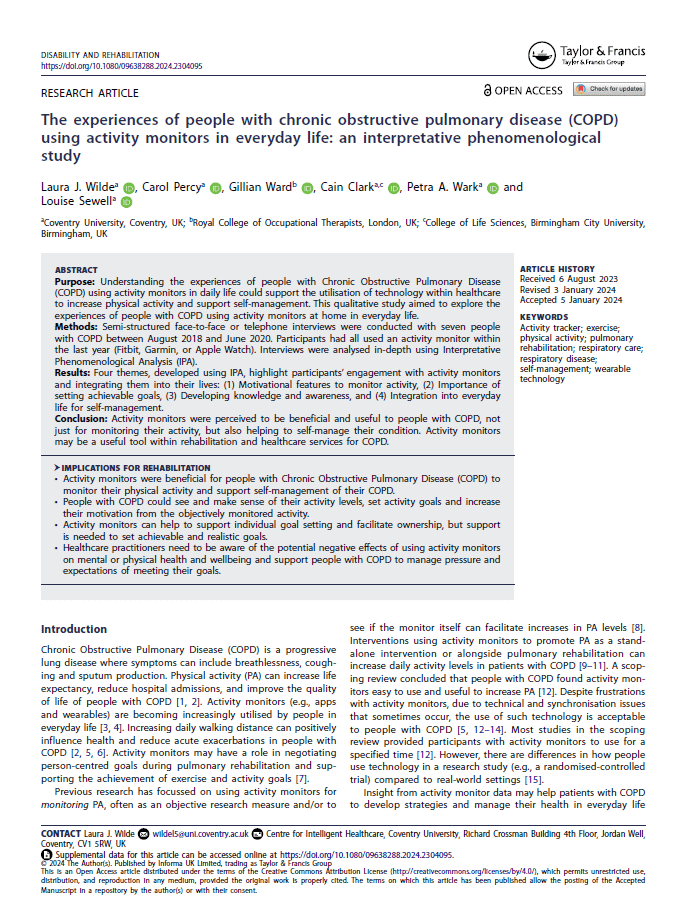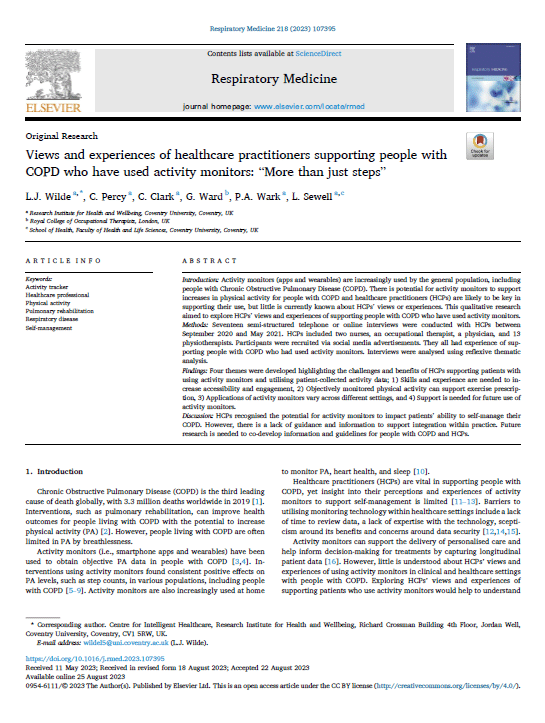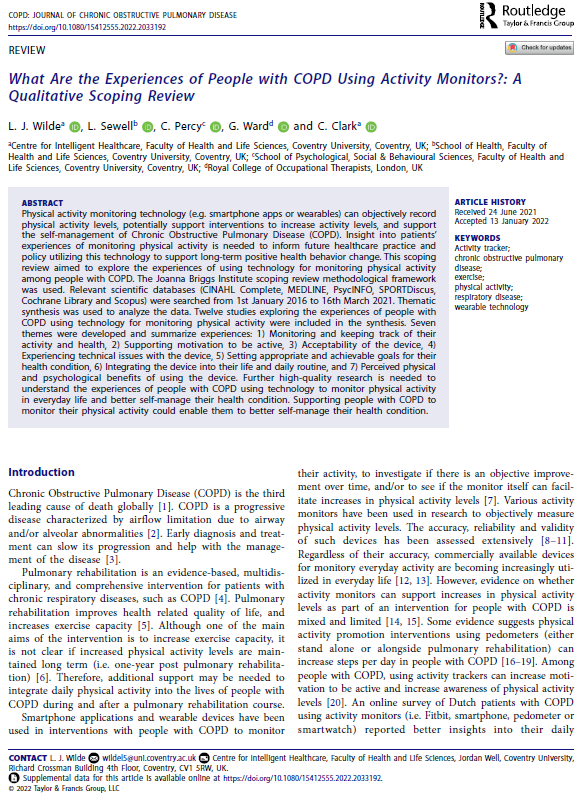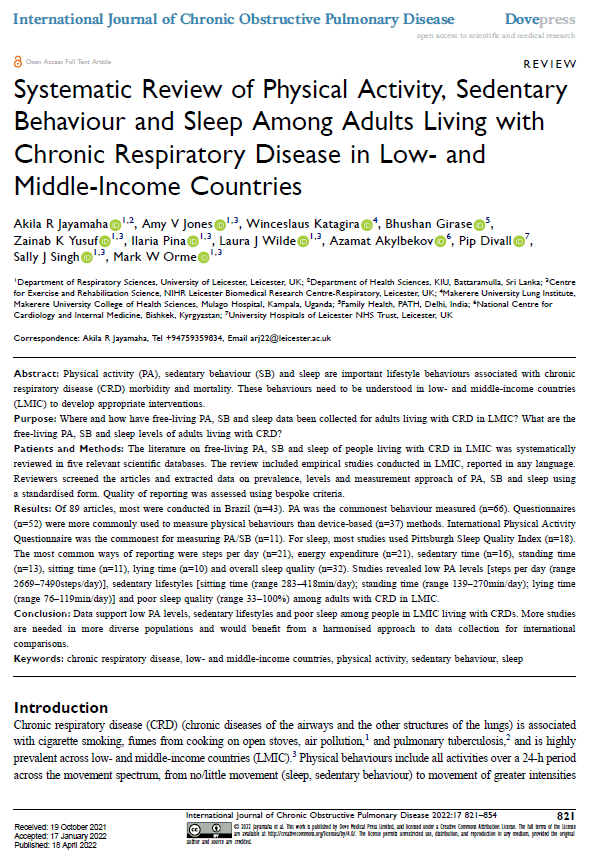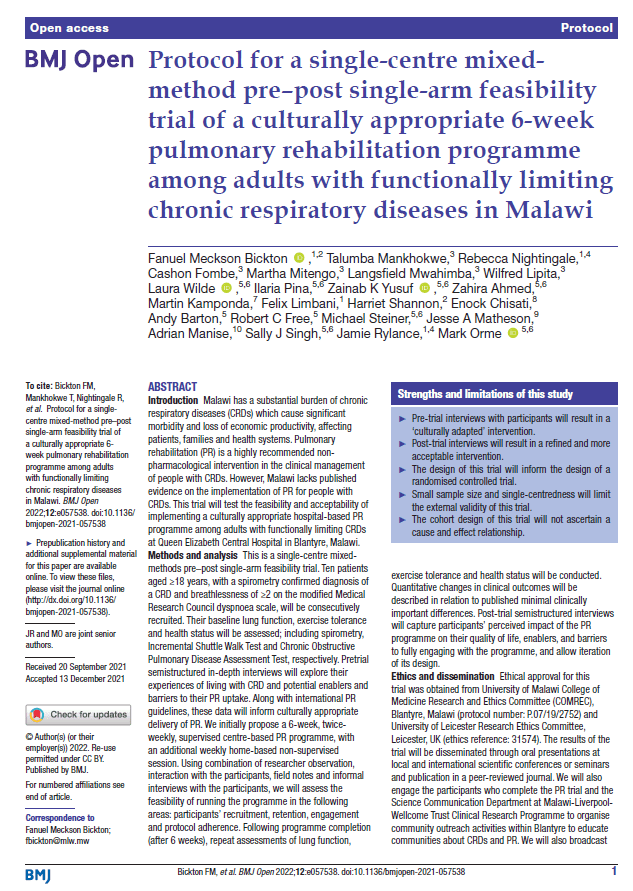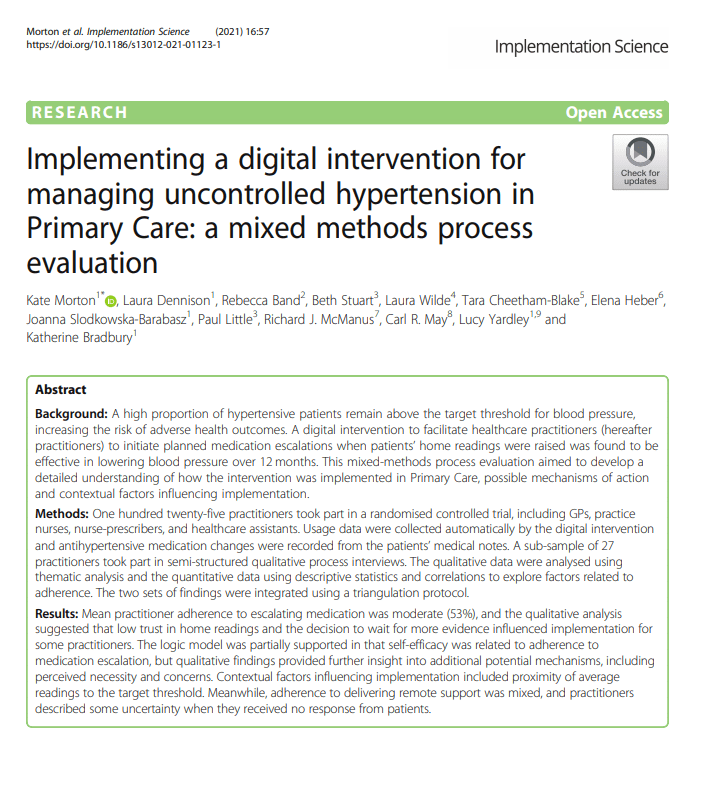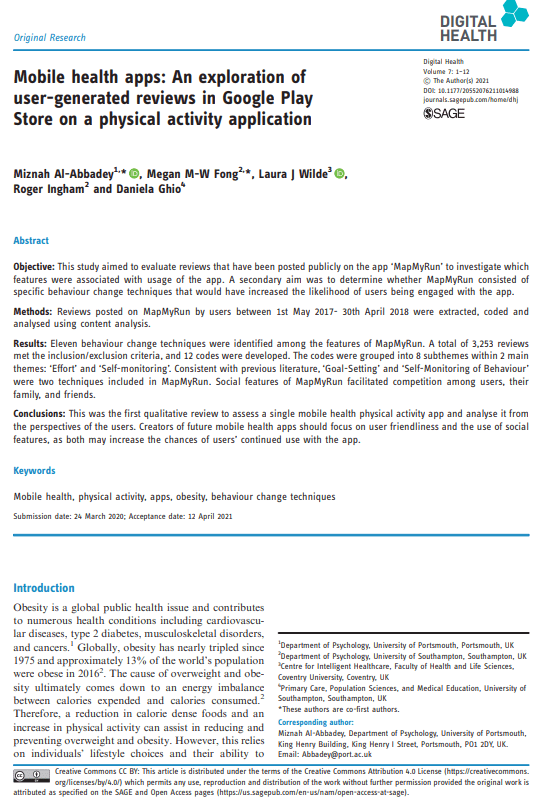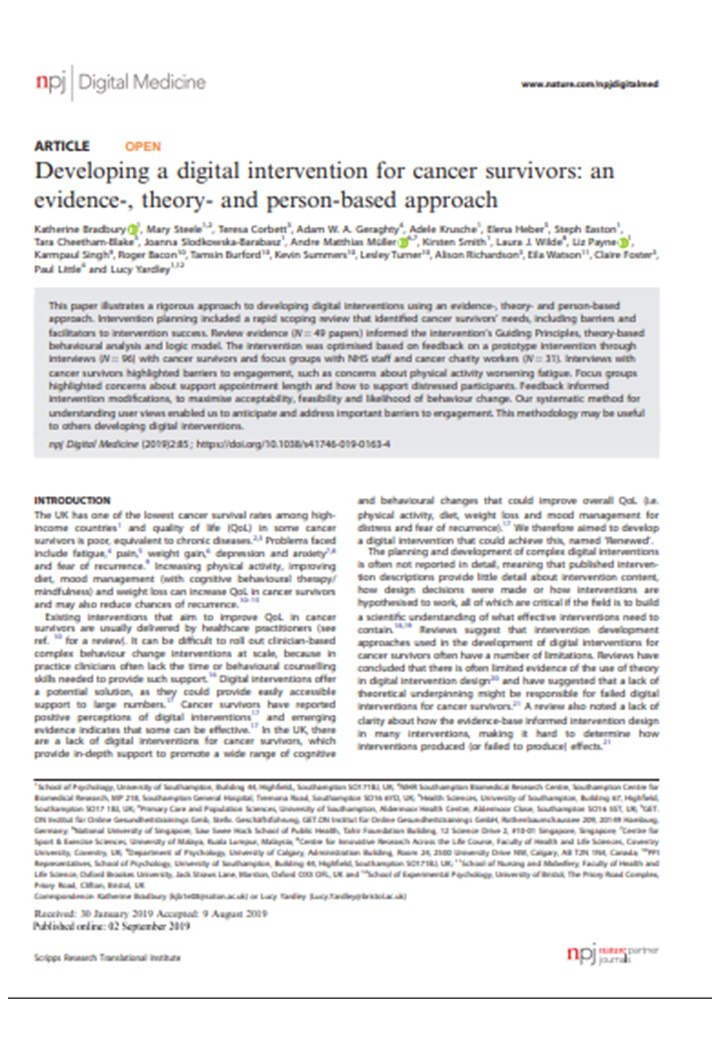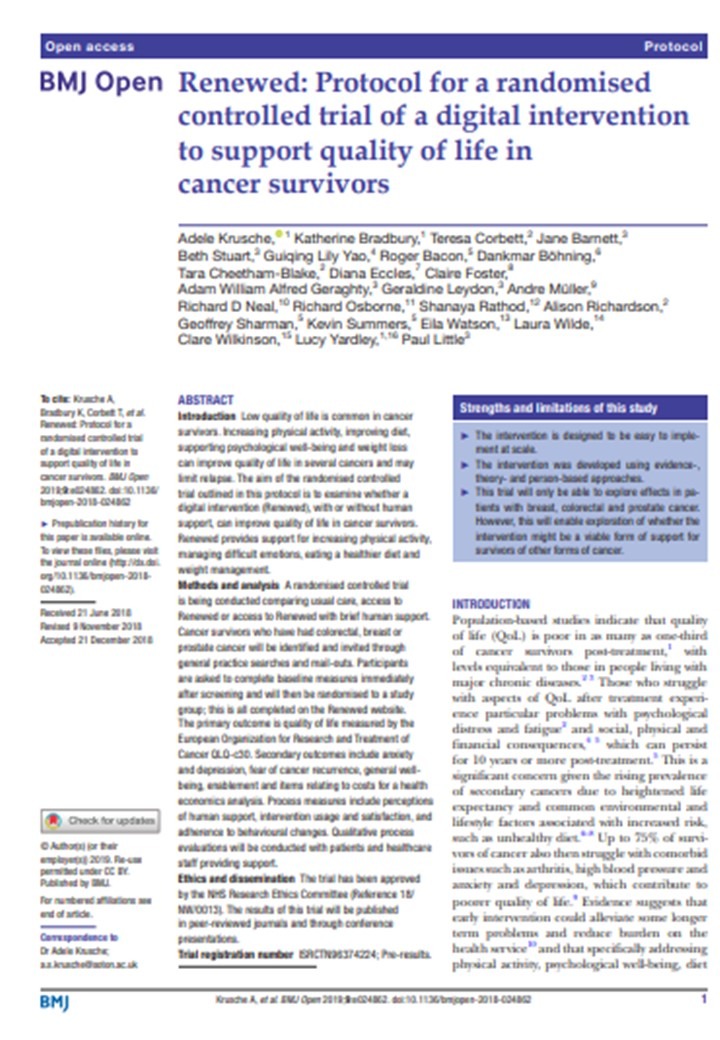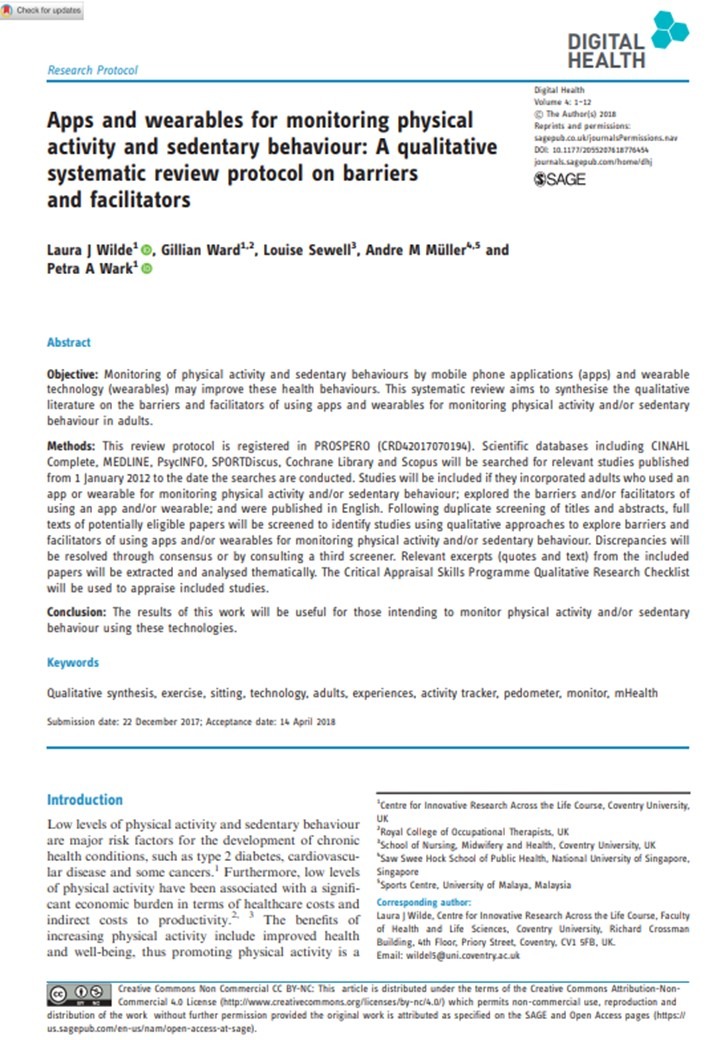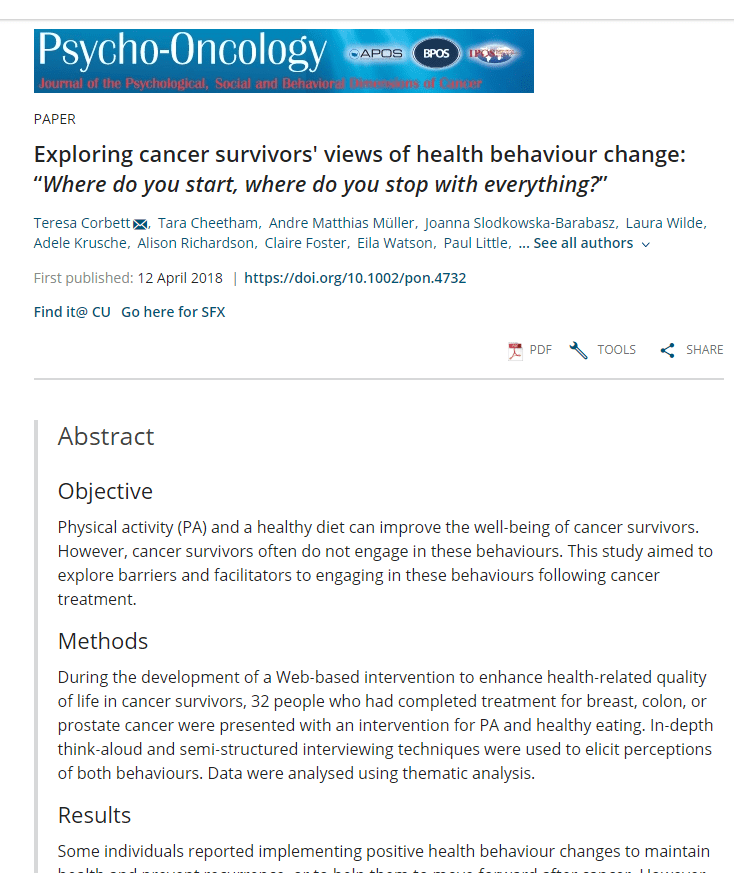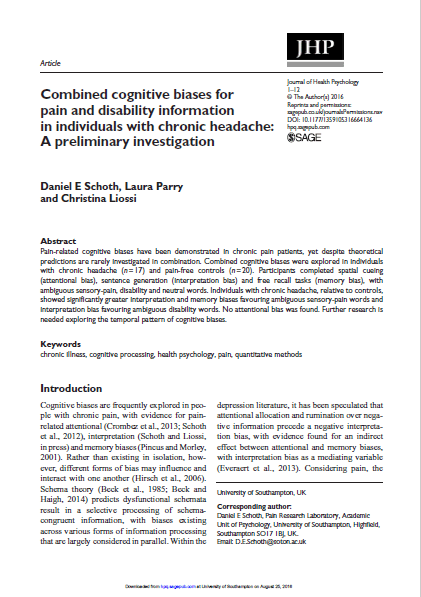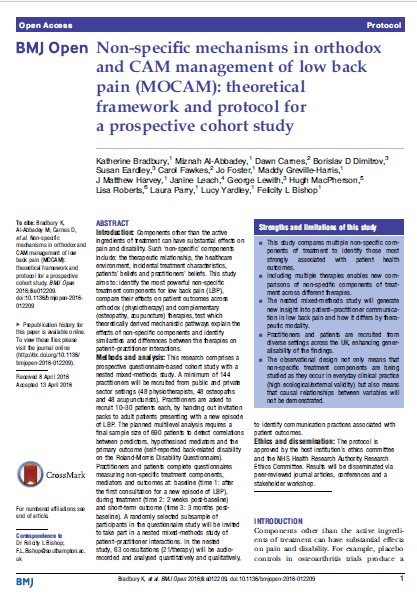The experiences of people with chronic obstructive pulmonary disease (COPD) using activity monitors in everyday life: an interpretative phenomenological study
Wilde, L. J., Percy, C., Ward, G., Clark C., Wark, P.A., & Sewell, L. (2024). Disability and Rehabilitation. DOI: https://doi.org/10.1080/09638288.2024.2304095
Abstract: Understanding the experiences of people with Chronic Obstructive Pulmonary Disease (COPD) using activity monitors in daily life could support the utilisation of technology within healthcare to increase physical activity and support self-management. This qualitative study aimed to explore the experiences of people with COPD using activity monitors at home in everyday life....
Views and experiences of healthcare practitioners supporting people with COPD who have used activity monitors: “More than just steps”
Wilde, L. J., Percy, C., Clark C., Ward, G., Wark, P.A., & Sewell, L. (2023). Respiratory Medicine. DOI: https://doi.org/10.1016/j.rmed.2023.107395
Abstract: Activity monitors (apps and wearables) are increasingly used by the general population, including people with Chronic Obstructive Pulmonary Disease (COPD). There is potential for activity monitors to support increases in physical activity for people with COPD and healthcare practitioners (HCPs) are likely to be key in supporting their use, but little is currently known about HCPs' views or experiences...
Experiences of using apps and wearables for monitoring physical activity among people with COPD: A scoping review
Wilde, L. J., Sewell, L., Percy, C., Ward, G., & Clark C. (2022). COPD: Journal of Chronic Obstructive Pulmonary Disease. DOI: https://doi.org/10.1080/15412555.2022.2033192
Abstract: Physical activity monitoring technology (e.g. smartphone apps or wearables) can objectively record physical activity levels, potentially support interventions to increase activity levels, and support the self-management of Chronic Obstructive Pulmonary Disease (COPD)...
Systematic Review of Physical Activity, Sedentary Behaviour and Sleep Among Adults Living with Chronic Respiratory Disease in Low- and Middle-Income Countries.
Jayamaha AR, Jones AV, Katagira W, Girase B, Yusuf ZK, Pina I, Wilde LJ, Akylbekov A, Divall P, Singh SJ, Orme MW. (2022) Int J Chron Obstruct Pulmon Dis. 2022;17:821-854. DOI:
https://doi.org/10.2147/COPD.S345034
Developing public transport messaging to provide crowding information during COVID-19: Application of the COM-B model and behaviour change wheel
Krusche, A., Wilde, L., Ghio, G., Morrissey, C., Froom, A., & Chick, D. (2022). Transportation Research Interdisciplinary Perspectives. DOI: https://doi.org/10.1016/j.trip.2022.100564
Protocol for a single-centre mixed-method pre–post single-arm feasibility trial of a culturally appropriate 6-week pulmonary rehabilitation programme among adults with functionally limiting chronic respiratory diseases in Malawi
, Fombe C, Mitengo M, Mwahimba L, Lipita W, Wilde L, Pina I, Yusuf ZK, Ahmed Z, Kamponda M, Limbani L, Shannon H, Chisati H, Barton A, Free RC, Steiner M, Matheson JA, Manise A, Singh SJ, Rylance J, Orme M (2022). BMJ Open. DOI: 10.1136/bmjopen-2021-057538
Abstract: Malawi has a substantial burden of chronic respiratory diseases (CRDs) which cause significant morbidity and loss of economic productivity, affecting patients, families and health systems. Pulmonary rehabilitation (PR) is a highly recommended non-pharmacological intervention in the clinical management of people with CRDs...
Implementing a digital intervention for managing uncontrolled hypertension in Primary Care: A mixed methods process evaluation of healthcare practitioners’ experiences
Morton, K., Dennison, L., Band, R., Wilde, L., Cheetham-Blake, T., Heber, E., Slodkowska-Barabasz, J., Little, P, McManus, R. J., May, C. R., Yardley, L., & Bradbury, K. (2021). Implementation Science https://doi.org/10.1186/s13012-021-01123-1
Mobile health apps: An exploration of user-generated reviews in Google Play store on a physical activity application
Developing a digital intervention for cancer survivors: An evidence, theory and person-based approach
Bradbury, K., Steele, M., Corbett, T., Geraghty, A., Krusche, A., Heber, E., Easton, S., Cheetham-Blake, T., Slodkowska-Barabasz, J., Müller, A. M., Smith, K., Wilde, L. J., Payne, L., Singh, K., Bacon, R., Burford, T., Summers, K., Turner, L., Richardson, A., Watson, E., Foster, C., Little, P., & Yardley, L. (2019).
DOI: 10.1038/s41746-019-0163-4
Abstract: This paper illustrates a rigorous approach to developing digital interventions using an evidence-, theory- and person-based approach. Intervention planning included a rapid scoping review which identified cancer survivors’ needs, including barriers and facilitators to intervention success...
Renewed: Protocol for a randomised controlled trial of a digital intervention to support quality of life in cancer survivors
Krusche, A., Bradbury, K., Corbett, T., Barnett, J., Stuart, B., Yao G.L., Bacon, R., Böhning, D., Cheetham, T., Eccles, D., Foster, C., Geraghty, A.W.A., Leydon, G., Müller, A., Neal, R., Osborne, R., Rathod, S., Richardson, A., Sharman, G., Summers, K., Watson, E., Wilde, L., Wilkinson, C., Yardley, L., & Little, P. (2019).
DOI: 10.1136/bmjopen-2018-024862
Abstract: Low quality of life is common in cancer survivors. Increasing physical activity, improving diet, supporting psychological well-being and weight loss can improve quality of life in several cancers and may limit relapse....
Apps and wearables for monitoring physical activity and sedentary behaviour: A qualitative systematic review protocol on barriers and facilitators
Wilde, L. J., Ward, G., Sewell, L., Müller, A. M., & Wark, P. W. (2018). Digital Health. DOI: 10.1177/2055207618776454
Abstract: Monitoring of physical activity and sedentary behaviours by mobile phone applications (apps) and wearable technology (wearables) may improve these health behaviours. This systematic review aims to synthesise the qualitative literature on the barriers and facilitators of using apps and wearables to monitor physical activity and/or sedentary behaviour in adults...
PROSPERO Registration: CRD42017070194
Exploring cancer survivors’ views of health behavior change: “Where do you start, where do you stop with everything?”
Corbett, T., Cheetham, T., Müller, A. M., Slodkowska-Barabasz, J., Wilde, L. J., Krusche, A., Richardson, A., Foster, C. L., Watson, E., Little, P., Yardley, L., & Bradbury, K. (2018). Psycho-Oncology.
DOI: 10.1002/pon.4732
Abstract: Objective Physical activity (PA) and a healthy diet can improve the well-being of cancer survivors. However, cancer survivors often do not engage in these behaviours. This study aimed to explore barriers and facilitators to engaging in these behaviours following cancer treatment. Methods During the development of a web-based intervention to enhance health-related quality of life in cancer survivors, 32 people who had...
Combined cognitive biases for pain and disability information in individuals with chronic headache: A preliminary investigation
Schoth, D. E., Parry, L., & Liossi, C. (2016). Journal of Health Psychology.
DOI: 10.1177/1359105316664136
Pain-related cognitive biases have been demonstrated in chronic pain patients, yet despite theoretical predictions are rarely investigated in combination. Combined cognitive biases were explored in individuals with chronic headache (n = 17) and pain-free controls (n = 20). Participants completed spatial cueing (attentional bias), sentence generation (interpretation bias) and free recall tasks (memory bias), with ambiguous sensory-pain, disability and neutral words. ...
Non-specific Mechanisms in Orthodox and CAM management of low back pain (MOCAM). Theoretical Framework and Protocol for a Prospective Cohort Study
Bradbury, K., Al-Abbadey, M., Carnes, D., Dimitrov, B. D., Eardley, S., Fawkes, C., Foster, J., Greville-Harris, M., Harvey, J. M., Leach, J., Lewith, G., MacPherson, H., Roberts, L., Parry, L., Yardley, L., & Bishop, F. L. (2016) , BMJ open, 6:e012209. DOI: 10.1136/bmjopen-2016-012209
Components other than the active ingredients of treatment can have substantial effects on pain and disability. Such ‘non-specific’ components include: the therapeutic relationship, the healthcare environment, incidental treatment characteristics, patients’ beliefs and practitioners’ beliefs. This study aims to: identify the most powerful non-specific treatment components for low back pain (LBP), compare their effects on...
Get in touch...
To keep updated about new publications or to find out how I may be useful to you...

